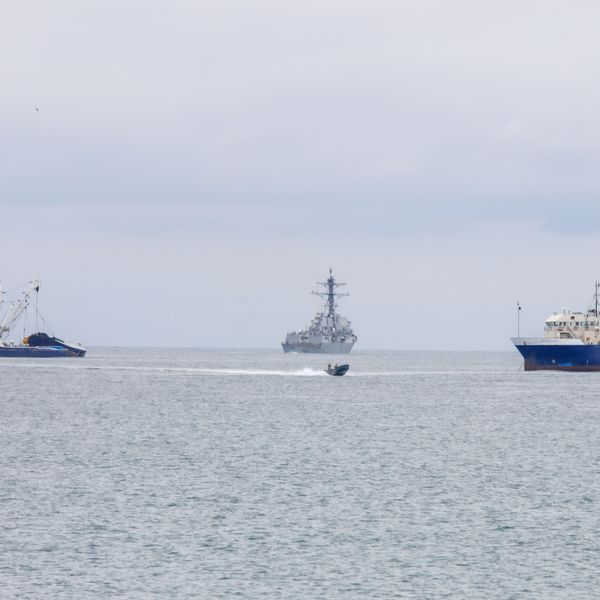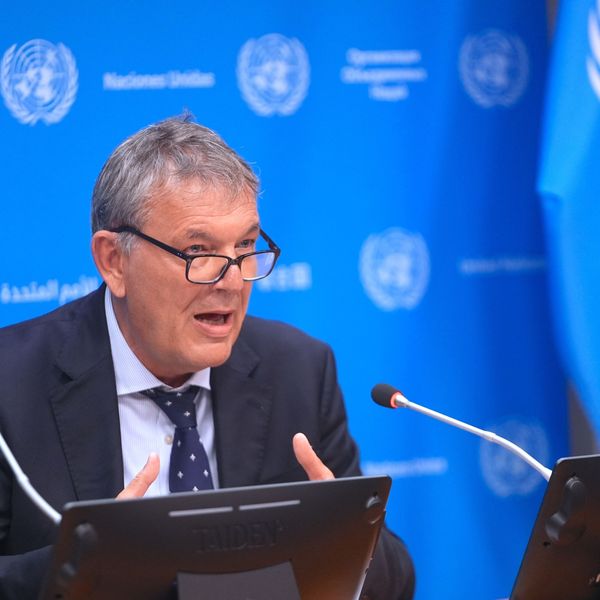UN Official Fears Act of 'Mass Murder in the Mediterranean'
Experts say this year's death rate for migrants and refugees attempting to cross to Europe is already three times the 2013 rate
Up to 500 Palestinians, Syrians, Egyptians and Sudanese refugees and migrant workers died last week when their boat sank off the coast of Malta in what appears to be a deliberate ramming by human traffickers amounting to "mass murder," a United Nations official announced Friday.
Survivors of the tragedy--who reportedly paid $4,000 apiece-- told the International Organization for Migration that, before the sinking, they were forced to endure subhuman conditions in which as many as 300 migrants, including up to 100 children, were crammed into a below-deck area, while 200 were held above deck without shade.
Five days into their journey, which embarked from the Egyptian port of Damietta on September 6, the passengers were told by smugglers to move to a smaller and less sea-worthy vessel. At this point, chaos ensued, said the survivors. Many migrants refused to get on the smaller vessel, and some ended up in the water. At a certain point, the smaller boat, manned by smugglers, reportedly rammed the vessel holding hundreds of migrants. "After they hit our boat they waited to be sure that it had sunk completely before leaving. They were laughing," one survivor told IOM. Only 11 survivors were located and rescued by authorities in Italy, Malta and Greece.
UN High Commissioner for Human Rights Zeid Ra'ad Al Hussein on Friday slammed what appeared to be a deliberate killing and called for states to "investigate such atrocious crimes, bring the perpetrators to justice, and even more importantly to do more to prevent them from happening in the first place." He stated, "If the survivors' accounts are indeed true--and they appear all too credible--we are looking at what amounts to mass murder in the Mediterranean."
But critics charge that the harsh migration policies of states are the root cause of the high migrant death toll in the Mediterranean, because they force people to turn to smugglers. IOM asks, "How can this [death] be avoided? First, by forging policies to enable refugees' legal, safe migration to Europe. There, many victims of the recent Mediterranean tragedies reportedly had family members waiting to receive them."
From Gaza to Egypt to Syria, conditions of poverty and war, which Western countries have a direct hand in, are driving people to make the treacherous voyage across the Mediterranean in greater numbers, migration experts warn.
Michel Gabaudan, President of Refugees International told PBS this week, "People are becoming desperate. At the beginning, when refugees were fleeing Syria, they thought perhaps after a few months or a year they would be able to go back. There is no indication that return is possible in the foreseeable future."
According to IOM's Missing Migrants Project, in 2014 more than 2,200 migrants have perished trying to reach Europe via the Mediterranean Sea. This death toll, already at three times that of 2013, is expected to pass 3,000 before the end of the year.
An Urgent Message From Our Co-Founder
Dear Common Dreams reader, The U.S. is on a fast track to authoritarianism like nothing I've ever seen. Meanwhile, corporate news outlets are utterly capitulating to Trump, twisting their coverage to avoid drawing his ire while lining up to stuff cash in his pockets. That's why I believe that Common Dreams is doing the best and most consequential reporting that we've ever done. Our small but mighty team is a progressive reporting powerhouse, covering the news every day that the corporate media never will. Our mission has always been simple: To inform. To inspire. And to ignite change for the common good. Now here's the key piece that I want all our readers to understand: None of this would be possible without your financial support. That's not just some fundraising cliche. It's the absolute and literal truth. We don't accept corporate advertising and never will. We don't have a paywall because we don't think people should be blocked from critical news based on their ability to pay. Everything we do is funded by the donations of readers like you. Will you donate now to help power the nonprofit, independent reporting of Common Dreams? Thank you for being a vital member of our community. Together, we can keep independent journalism alive when it’s needed most. - Craig Brown, Co-founder |
Up to 500 Palestinians, Syrians, Egyptians and Sudanese refugees and migrant workers died last week when their boat sank off the coast of Malta in what appears to be a deliberate ramming by human traffickers amounting to "mass murder," a United Nations official announced Friday.
Survivors of the tragedy--who reportedly paid $4,000 apiece-- told the International Organization for Migration that, before the sinking, they were forced to endure subhuman conditions in which as many as 300 migrants, including up to 100 children, were crammed into a below-deck area, while 200 were held above deck without shade.
Five days into their journey, which embarked from the Egyptian port of Damietta on September 6, the passengers were told by smugglers to move to a smaller and less sea-worthy vessel. At this point, chaos ensued, said the survivors. Many migrants refused to get on the smaller vessel, and some ended up in the water. At a certain point, the smaller boat, manned by smugglers, reportedly rammed the vessel holding hundreds of migrants. "After they hit our boat they waited to be sure that it had sunk completely before leaving. They were laughing," one survivor told IOM. Only 11 survivors were located and rescued by authorities in Italy, Malta and Greece.
UN High Commissioner for Human Rights Zeid Ra'ad Al Hussein on Friday slammed what appeared to be a deliberate killing and called for states to "investigate such atrocious crimes, bring the perpetrators to justice, and even more importantly to do more to prevent them from happening in the first place." He stated, "If the survivors' accounts are indeed true--and they appear all too credible--we are looking at what amounts to mass murder in the Mediterranean."
But critics charge that the harsh migration policies of states are the root cause of the high migrant death toll in the Mediterranean, because they force people to turn to smugglers. IOM asks, "How can this [death] be avoided? First, by forging policies to enable refugees' legal, safe migration to Europe. There, many victims of the recent Mediterranean tragedies reportedly had family members waiting to receive them."
From Gaza to Egypt to Syria, conditions of poverty and war, which Western countries have a direct hand in, are driving people to make the treacherous voyage across the Mediterranean in greater numbers, migration experts warn.
Michel Gabaudan, President of Refugees International told PBS this week, "People are becoming desperate. At the beginning, when refugees were fleeing Syria, they thought perhaps after a few months or a year they would be able to go back. There is no indication that return is possible in the foreseeable future."
According to IOM's Missing Migrants Project, in 2014 more than 2,200 migrants have perished trying to reach Europe via the Mediterranean Sea. This death toll, already at three times that of 2013, is expected to pass 3,000 before the end of the year.
Up to 500 Palestinians, Syrians, Egyptians and Sudanese refugees and migrant workers died last week when their boat sank off the coast of Malta in what appears to be a deliberate ramming by human traffickers amounting to "mass murder," a United Nations official announced Friday.
Survivors of the tragedy--who reportedly paid $4,000 apiece-- told the International Organization for Migration that, before the sinking, they were forced to endure subhuman conditions in which as many as 300 migrants, including up to 100 children, were crammed into a below-deck area, while 200 were held above deck without shade.
Five days into their journey, which embarked from the Egyptian port of Damietta on September 6, the passengers were told by smugglers to move to a smaller and less sea-worthy vessel. At this point, chaos ensued, said the survivors. Many migrants refused to get on the smaller vessel, and some ended up in the water. At a certain point, the smaller boat, manned by smugglers, reportedly rammed the vessel holding hundreds of migrants. "After they hit our boat they waited to be sure that it had sunk completely before leaving. They were laughing," one survivor told IOM. Only 11 survivors were located and rescued by authorities in Italy, Malta and Greece.
UN High Commissioner for Human Rights Zeid Ra'ad Al Hussein on Friday slammed what appeared to be a deliberate killing and called for states to "investigate such atrocious crimes, bring the perpetrators to justice, and even more importantly to do more to prevent them from happening in the first place." He stated, "If the survivors' accounts are indeed true--and they appear all too credible--we are looking at what amounts to mass murder in the Mediterranean."
But critics charge that the harsh migration policies of states are the root cause of the high migrant death toll in the Mediterranean, because they force people to turn to smugglers. IOM asks, "How can this [death] be avoided? First, by forging policies to enable refugees' legal, safe migration to Europe. There, many victims of the recent Mediterranean tragedies reportedly had family members waiting to receive them."
From Gaza to Egypt to Syria, conditions of poverty and war, which Western countries have a direct hand in, are driving people to make the treacherous voyage across the Mediterranean in greater numbers, migration experts warn.
Michel Gabaudan, President of Refugees International told PBS this week, "People are becoming desperate. At the beginning, when refugees were fleeing Syria, they thought perhaps after a few months or a year they would be able to go back. There is no indication that return is possible in the foreseeable future."
According to IOM's Missing Migrants Project, in 2014 more than 2,200 migrants have perished trying to reach Europe via the Mediterranean Sea. This death toll, already at three times that of 2013, is expected to pass 3,000 before the end of the year.

